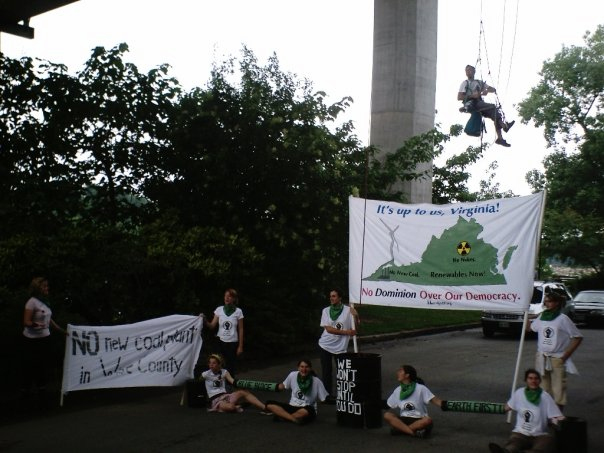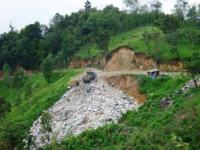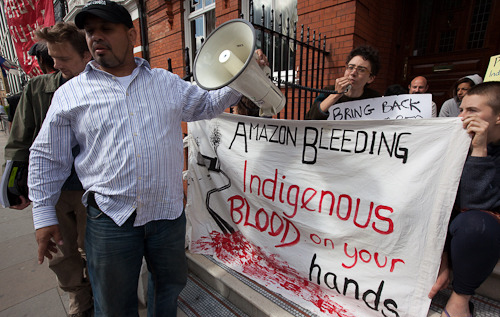 In the past several months, three efforts that Earth First! (EF!) has contributed action and energy to in Virginia have gained significant victories. In each of these cases, our involvement has been relatively small compared to the efforts of other groups, and all credit is due to them for doing the un-sexy, demanding work of dragging these industries through the courts and regulatory processes where these victories were ultimately won. While we envision and work to create a world where destructive projects are stopped by sheer force of grassroots direct action, we do indeed believe in using every tool in the toolbox.
In the past several months, three efforts that Earth First! (EF!) has contributed action and energy to in Virginia have gained significant victories. In each of these cases, our involvement has been relatively small compared to the efforts of other groups, and all credit is due to them for doing the un-sexy, demanding work of dragging these industries through the courts and regulatory processes where these victories were ultimately won. While we envision and work to create a world where destructive projects are stopped by sheer force of grassroots direct action, we do indeed believe in using every tool in the toolbox.
Here’s a brief synopsis of some of those tools being put to work over the past two years:
The first action taken by the current incarnation of Blue Ridge Earth First! (BREF!) was a demonstration at the home of a developer driving efforts to build a Wal-Mart in Blacksburg, Virginia. There was never a long-term direct action strategy hashed out to defeat this project. While an emerging community group developed support and momentum towards legislating and later litigating their opposition into law, our action served chiefly as a reminder that civil discourse with those who would desecrate our communities for a buck is no virtue. The demonstration was also the coming-out party for a new EF! chapter ready to give some teeth to the environmental movement in the hills of Virginia.
As BREF! shifted our focus to other projects, efforts to stop the Wal-Mart through any well-mannered, government-sanctioned and truly boring means necessary, persisted and ultimately reigned triumphant by way of appealing a local zoning ordinance all the way to the Supreme Court of Virginia. While the parade of Earth First!ers making merry in developer Jeannie Stosser’s front yard played a small part in the whole turn of events, it is nonetheless a gratifying victory for our more well-behaved allies and a pleasant reminder that, when pressure builds, it eventually breaks.
On the mountaintop removal (MTR) front, a bittersweet victory was won on May 7, when the Army Corps of Engineers, responding to a prompt by the Environmental Protection Agency (EPA), rescinded a permit for A&G coal’s Ison Rock mine. Over the past several years, the Southern Appalachian Mountain Stewards, a local community group has clogged regulatory processes and spoken out loudly against this mine. In 2004, A&G’s failure to conform to the laws for exactly how a mountain is supposed to be destroyed resulted in a boulder rolling off of a MTR mine and killing a three-year old boy asleep in his bed, prompting Katuah Earth First! to chain, lock and glue the gates to that mine closed. In 2007, this same corporation was the target of sabotage at one of it’s Wise County mountain-top removal sites by a group calling itself the “Committee to Defend the Land and People.”
The Ison Rock mine would have totaled 1,300 acres in scope and would have buried three miles of streams. This is the first time that a MTR permit has ever been rescinded due to intervention by a federal regulatory body—evidence that the mounting and increasingly militant opposition to MTR of the past several years is having an effect on policy decisions. The EPA and Army Corps reasoned that the sprawling mine would violate the Clean Water Act if it dumped mining waste into streams, a practice that always accompanies MTR operations known as “valley fills.” The bitterness of this win comes with the fact that, shortly after Obama’s EPA rescinded this and five other permits, the coal industry applied pressure for the administration to give word on 42 other pending MTR permits, which resulted in the EPA declaring that they’re all fine to proceed. Why are six MTR/valley fill mines in violation of the clean water act and 42 aren’t? Politics. They’re throwing us a bone here. We’ll take that bone, and then we’ll beat them senseless with it. All MTR buries streams! Until all MTR permits are revoked, we won’t stop!
In another case of the Clean Water Act finally being enforced, Dominion Power’s plans to add a third reactor to its Lake Anna nuclear plant were thwarted by a lawsuit brought forth by the Blue Ridge Environmental Defense League (BREDL) in February. Lawyers for BREDL, an organization supporting environmental justice struggles throughout the southeast, proved in court that operations at the plant are raising temperatures in Lake Anna to over 100 degrees in the summertime. This is the same power plant where EF!, Rising Tide and others staged a sit-in during last summer’s Southeast Convergence for Climate Action.
In the nearly two years that our small EF! collective has existed, we’ve made a deliberate effort to execute direct actions with a timing and sensibility that work concurrently with the campaigns of our friends, neighbors and allies who have the stomach to tangle up the state within the parameters of its own procedures. We do not have the time, taste, expertise or resources to spearhead these efforts ourselves but we see how they can be utilized effectively. The problem with any victory won by virtue of state approval is that the state retains the power to reverse that judgment. By bypassing the “designated channels” to express our dissent and employing actions that directly disrupt the operations we oppose, we demonstrate a readiness among the general public to reject the rules of our oppressors and defend ourselves as is our natural right. This presence reinforces the truth that favorable government actions are forced by the will of the people rather than being handed down by the benevolence of the ruling class. If we treat these wins as the end of a story and allow the hard-earned and slowly-built grassroots power that produced these victories to whither, then this is as close to justice as we will ever get. If, instead, we understand them as markers in the movement towards achieving all power to all people, then onward. It is the propagation of this sentiment as well as the specific points of impact resulting from our actions that we contribute to the environmental movement in the mountains of Appalachia.

 Neighbours of Pajopom Village from Esquipulas Palo Gordo don´t want trash from San Marcos anymore. From June 15th 2009 they have prevent the discharge of garbage in an illegal garbage dump in their community by having a pacific protest in front of the community saloon. Adults, young people and even children had been rotating since early in the morning until the sunset, in order to fight for their lives and a safe environment.
Neighbours of Pajopom Village from Esquipulas Palo Gordo don´t want trash from San Marcos anymore. From June 15th 2009 they have prevent the discharge of garbage in an illegal garbage dump in their community by having a pacific protest in front of the community saloon. Adults, young people and even children had been rotating since early in the morning until the sunset, in order to fight for their lives and a safe environment. 19 June 2009
19 June 2009